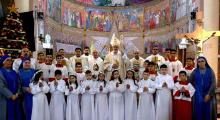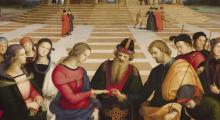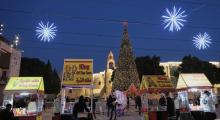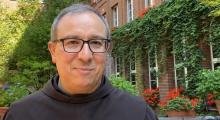Issued by the Catholic Center for Studies and Media - Jordan. Editor-in-chief Fr. Rif'at Bader - موقع أبونا abouna.org

Following is the meditation of Most Rev. Archbishop Pierbattista Pizzaballa, Apostolic Administrator of the Latin Patriarchate of Jerusalem, for the third Sunday in Lent, Year A, March 15, 2020:
The readings of the Sundays of Lent, particularly those of Year A which we are living, offer us a path of growth for living as disciples. Today’s passage, together with those of the next few Sundays, constitutes a lengthy baptismal catechesis that we cannot fully appreciate. We will, therefore, limit ourselves only to a few ideas.
On the First Sunday of Lent, we were taken to the desert, where knowing our hearts have been given to us, where who we are and to whom we belong have been revealed to us. On the Second Sunday, the disciple learns on a high mountain, gradually, to listen and see Jesus, His life in the total gift of self.
On this Third Sunday, discovering which desire dwells deeply in us is given to us.
The location where this happens is Sychar, a city of Samaria where Jesus, coming from Judea and going to Galilee, tired from the journey, stops at a well while His disciples go to the city to stock up on food (John 4:3-8). Here Jesus meets a Samaritan woman and begins a long and complex dialogue with her, in which the two conversationalists seem not to understand each other.
Yet this woman, who always seems to misunderstand the words of Jesus, gradually comes in small steps to the faith.
The first step is given by the fact that Jesus simply speaks to her: it is He and not her, that begins the conversation. This creates a great astonishment in the woman: “How can you, a Jew, ask me, a Samaritan woman, for a drink?” (Jn 8:9). Actually, Jesus could and should have avoided this dialogue, for various reasons: because, first of all, His partner in conversation is a Samaritan woman and therefore a sort of heretic; also because she is living with a man who is not her husband and therefore, by law, she is considered an adulteress, a sinner; and finally, simply because she is a woman, and no Teacher of the Law would have stopped in public to speak with a woman.
Jesus, instead, speaks to her. “I am he, who speaking with you,” He will tell her at the end of the dialogue (Jn 4:26).
And He speaks to her not by reproaching her, and not even a catechesis; much more simply, He asks her for a drink.
The second step leads the woman to understand that there is something about herself that escapes her, something that’s missing in her, that can only be revealed to her: “If you knew the gift of God…” (Jn 4:16).
Sometimes we may think, like the Samaritan woman, that our life is entirely what we already know, in the habits that make up our daily life, in our past, but this is not so. Our true colors are still before us.
What is this gift which the woman thirsts for without knowing it?
It’s not that of water, as she thought. The thirst that lives in her is that of worshiping the Father in spirit and truth (Jn 4:23), in other words, to worship Him in love.
Truth, in John, is the plan of salvation that God has for humanity, the plan that Jesus came to fulfill, that by which the communion between God and man is restored: this is the real thirst of man.
And the woman of Samaria is in a certain manner a symbol of a lost humanity, drained by the effort of chasing after loves that do not satisfy thirst.
It is only within this relationship of Jesus, of the dialogue with Him, that the horizon opens again: we are not made for anything that is below this call to love.
Just as it was Jesus to start the dialogue, so it is He that also concludes it.
And He concludes it with an affirmation in the face of which the woman has nothing to say: This important statement of Jesus, “I am He that is speaking with you,” says that the One who knows and fills the thirst of man is present now, and there are no other words to add.
Now the space for faith opens, which the woman begins with a race towards the city, towards her people, to whom she repeats the invitation that had resounded in Jesus’ first words to His disciples: “Come and you will see” (Jn 1:39).
After that, the woman disappears, and the space for faith is opened for others, like a contagious meeting of good: “Many more began to believe in him because of his word, and they said to the woman, «We no longer believe because of your word; for we have heard for ourselves, and we know that this is truly the savior of the world»” (Jn 4:41-42).
+ Pierbattista







